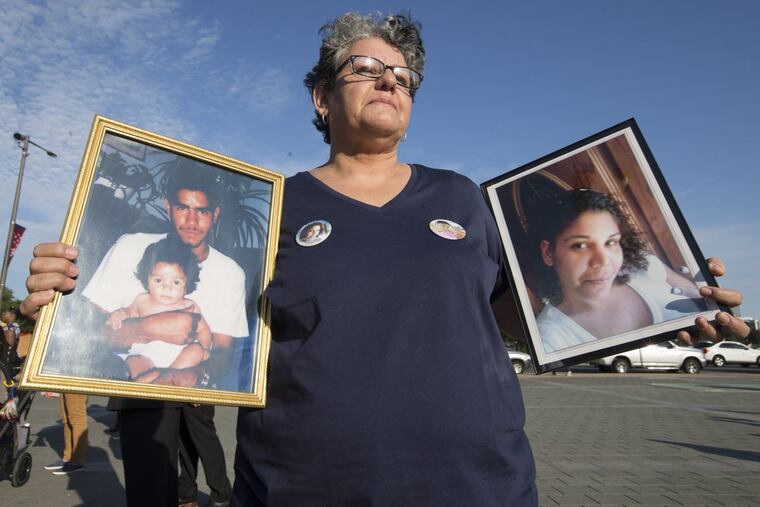With 2 children lost to gun violence, Philly woman waits for answers | Helen Ubiñas
There is an ever-growing fellowship of mothers and fathers of murdered children in Philadelphia, parents who share the agonizing grief of losing a child. Silvia Barreto's pain is doubled. She's lost two children to gun violence.

The knock on the door came early, at an hour when good news rarely waits on the other side.
Silvia Barreto opened the door. It was her daughter's friend.
Even before he said anything, Barreto felt the familiar dread.
This can't be happening again, she thought. Please, God, don't let this be happening again.
You have to come with me, the man said.
It's Cristina.
Barreto cried as she rushed to throw some clothes on, her mind flashing back 20 years. Then, it had been her daughter, Cristina Tosado, who told her to get to the hospital.
In 1996, it was Barreto's 17-year-old son, Andre Reyes, who was shot during a robbery. He had $5 in his pocket.
It was happening again. This had to be a nightmare, she thought.
Barreto willed herself to wake up. Please, God, let me wake up.
At the hospital, there was no denying that the horror unfolding was real. Tosado, 38, had been shot in the back and abdomen outside of a bar near the 2800 block of North Second Street after someone in a car started firing.
A couple of hours after Barreto got to Temple Hospital, the same hospital where her son had died, her daughter was gone, her second child to be lost to gun violence in Philadelphia.
And now, eight months after Tosado was killed on Feb. 19, Barreto fears that her daughter's death will go cold, just like her son's.
No one has been arrested in her daughter's killing. Her son's homicide, the city's 355th in 1996, remains on the books as a cold case.
There is an ever-growing fellowship of mothers and fathers of murdered children in Philadelphia, parents who share the agonizing grief of losing a child.
Barreto's pain, already doubled, intensifies as she watches her grandchildren forced to grow up without their parents.
Her son had an 8-month-old daughter when he was killed. Tosado left behind three children: two daughters, ages 22 and 18, and a son, 16. The three are living in their mother's rented house, determined to stay together, to make a family of what they have left. Their father died of leukemia in 2008.
The oldest, Ashley, has become the matriarch, of sorts, working six days a week at a Chestnut Hill pizza shop in hopes of buying a home for her family. When Ashley talks about her mother, who had been a pharmacy technician, she slips into the present tense.
"She's fun," she said. "Funny." Mother and daughter clashed sometimes but mostly because they were so much alike. Stubborn, hot-headed. Fiercely loyal and loving.
"I miss her," Ashley said. "There are times when I walk in the house and I still expect to see her there, to hear her voice."
Barreto has all but given up hope that she will live long enough to see justice in her son's case. But she's not ready to give up on getting justice for her daughter.
Some days Barreto, now retired from a nursing home job, stays up until 3 or 4 in the morning, in hopes of catching the detective assigned to her daughter's case at his desk. But even when she reaches him, she said, he doesn't have much to report.
While she waits for answers, she can't help but wonder: "Does the skin color of the person who is killed matter? Do [police] put in more effort for certain people? Does the area you live in matter? Do [police] think just because [her daughter was killed] in North Philly it didn't count, or that she was one of the lost souls of North Philly?
"My daughter was not a lost soul," she said. "She had so much going for her."
Police said the investigation is ongoing.
"I'm 60 years old," Barreto said, sobbing. "Maybe I have another 20 years. Maybe I don't. But even if I don't see [justice], maybe they will."
Ashley Tosado isn't convinced. The family has a lot of friends who have had a loved one murdered in Philly. Most of those cases remain unsolved, too.
"Everyone is getting accustomed to it," she said. "People don't talk, unless it happens to them."
"I know no one's going to talk. It's Philly."
After her son died, Barreto developed anxiety and depression and stopped going anywhere other than work and home. Now that she's buried a second child, she can go weeks without ever leaving her house.
"It breaks you," she said. "I am broken."